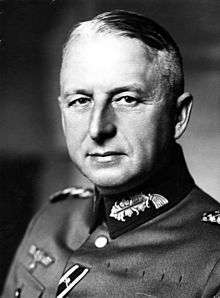
Erich von Manstein (November 24, 1887 – June 9, 1973) served the German military as a lifelong professional soldier. He became one of the most prominent commanders of Nazi Germany's armed forces (Wehrmacht). During World War II he attained the rank of Field Marshal (Generalfeldmarschall) and was held in high esteem by his fellow officers as one of the Wehrmacht's best military minds. He was dismissed from service by Adolf Hitler in March 1944, due to his frequent clashes with Hitler over military strategy. In 1949, he was brought on trial in Hamburg for war crimes, which convicted him of "Neglecting to protect civilian lives" and for using scorched earth tactics denying vital food supplies to the local population. He was sentenced to 18 years in prison, which was later reduced to 12. After release from British prison in 1953, he became a military advisor for the West German Government. Manstein suffered a stroke and died in Munich on the night of 9 June 1973. He was buried with full military honors.
Quotes
- If Paulus's army had capitulated before the end, the Russians would have had the advantage of withdrawing forces against Paulus and against the southern front, where I had only two Romanian armies. Therefore, the resistance of the Sixth German Army, even to the death of the last man, was necessary.
- To Leon Goldensohn (14 June 1946). Quoted in "The Nuremberg Interviews" - by Leon Goldensohn, Robert Gellately - History - 2004
- I tried at that time to relieve the Sixth Army, of which I was supreme commander, above Paulus, by counterattacks - but it was not possible. I gave the order finally for the Sixth Army to break out, but then Paulus said it was too late and not possible. Hitler did not want the Sixth Army to break out at any time, but to fight to the last man. I believe that Hitler said if the Sixth Army tried to break out, it would be their death.
- To Leon Goldensohn (14 June 1946). Quoted in "The Nuremberg Interviews" - by Leon Goldensohn, Robert Gellately - History - 2004
- The will for victory which gives a commander the strength to see a grave crisis through is something very different from Hitler's will, which in the last analysis stemmed from a belief in his own 'mission'. Such a belief makes a man impervious to reason and leads him to think that his own will can operate even beyond the limits of hard reality - whether these consist in the presence of far superior enemy forces, in the conditions of space and time, or merely in the fact that the enemy also happens to have a will of his own.
- Lost Victories[1], Hitler As Supreme Commander
- It has always been the particular forte of German leadership to grant wide scope to the self-dependence of subordinate commanders - to allot them tasks which leave the method of execution to the discretion of the individual. From time immemorial - certainly since the elder Moltke's day - this principle has distinguished Germany's military leadership from that of other armies.
- Describing Mission Command, Lost Victories, The Winter Campaign In South Russia
- But it is a well-known maxim of war that whoever tries to hold on to everything at once, finishes up by holding nothing at all.
- Lost Victories, The Winter Campaign In South Russia
About Manstein
- He was not only the most brilliant strategist of all our generals, but he had a good political sense. A man of that quality was too difficult for Hitler to swallow for long. At conferences Manstein often differed from Hitler, in front of others, and would go so far as to declare that some of the ideas which Hitler put forward were nonsense.
- The general verdict among the German generals I interrogated in 1945 was that Field-Marshal von Manstein had proved the ablest commander in their Army, and the man they had most desired to become its Commander-in-Chief. It is very clear that he had a superb sense of operational possibilities and equal mastery in the conduct of operations, together with a greater grasp of the potentialities of mechanized forces than any other commander who had not been trained in the tank arm. In sum, he had military genius.
- He is the best tactician and combat commander we have.
- Master of the Blitzkrieg.
- Manstein despised Göring and loathed Himmler. To his most trusted colleagues he admitted to Jewish antecedents. He could also be scathing about Hitler. As a joke, his dachshund Knirps had been trained to raise his paw in salute on the command "Heil Hitler". On the other hand, his wife was a great admirer of Hitler, and more importantly, Manstein, as already mentioned, had even issued that order to his troops mentioning "the necessity of hard measures against Jewry"
- Antony Beevor in Stalingrad (1998)
- He had utter disdain for the Nazis and had no time for their racial purity agenda.
- Nuremberg Trial transcripts
- I asked the Field Marshal von Manstein if he would take part in the actions against Hitler. Manstein was sitting in a chair and reading the Bible. Quick, almost embarrassed, he put it aside and covered it with some papers.
- Dietrich von Choltitz in Der Spiegel, 2nd of April 1952
External links
- ↑ Verlorene Siege, von Manstein 1955 ('Lost Victories' English translation by Anthony G Powell 1958)